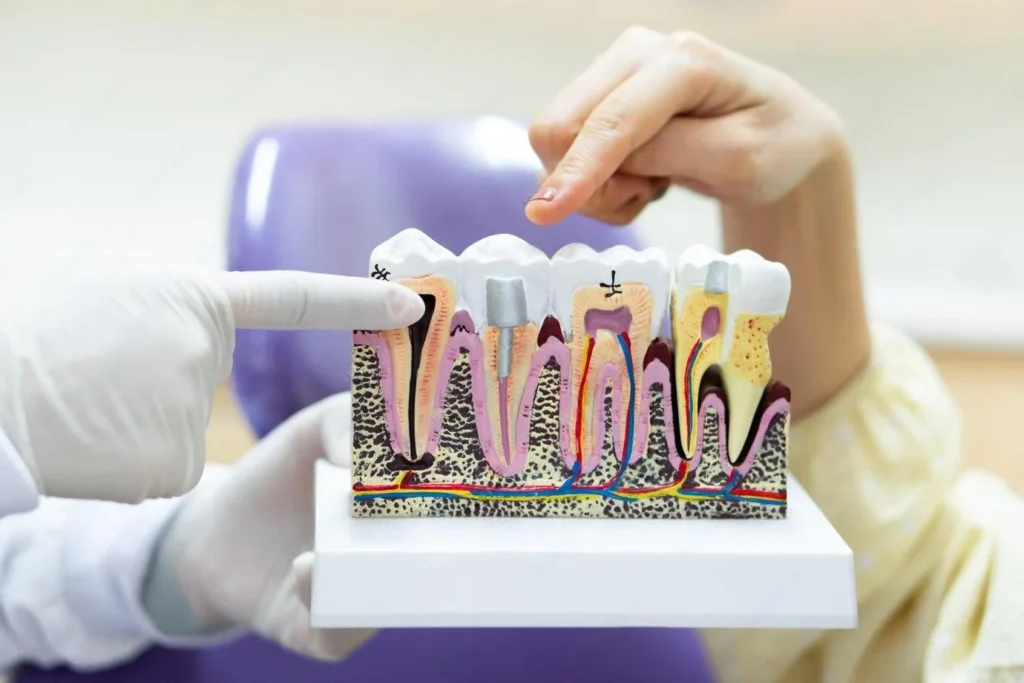Root canal treatment often gets a bad rap, conjuring images of discomfort and dread. But the reality is quite different. This dental procedure plays a vital role in saving teeth that would otherwise be lost due to infection or decay. While it’s designed to alleviate pain and restore health, many people still have concerns about root canal treatment side effects.
Understanding what happens during this process can ease fears and help patients make informed decisions about their oral health. In this blog post, we’ll demystify root canal treatments by addressing common misconceptions, detailing potential side effects, and discussing how to manage them effectively. We’ll also explore alternative options for those hesitant to undergo this procedure and emphasize the importance of maintaining good dental care practices.
So let’s dive in!
What is Root Canal Treatment?
Root canal treatment is a dental procedure aimed at saving teeth affected by infection or severe decay. It focuses on the pulp, the innermost part of the tooth that contains nerves and blood vessels.
When bacteria invade this area, it can lead to pain, swelling, and even abscesses. The treatment involves removing this infected pulp to prevent further damage.
During the procedure, your dentist will clean out the inside of the tooth and shape it for filling. Afterward, they seal it with a biocompatible material to restore its function.
Many patients may be surprised to learn that root canals are performed under local anesthesia. This means you’ll likely experience minimal discomfort during the procedure itself.
Restoration follows with a crown or filling to protect and strengthen your tooth once again. With proper care, treated teeth can last for many years.
Common Misconceptions about Root Canal Treatment
Many people believe that root canal treatment is an extremely painful procedure. This misconception often stems from stories of outdated methods. In reality, modern techniques and anesthesia have significantly reduced discomfort.
Another myth suggests that a root canal leads to illness or health complications. There’s no scientific evidence supporting this claim. In fact, saving a tooth through this treatment can prevent further problems down the line.
Some think that once you have a root canal, the tooth will never feel normal again. However, most patients regain full function and sensation in their treated teeth.
Many are led to believe that extraction is always a better option than undergoing a root canal. Preserving your natural tooth can be beneficial for long-term dental health; it maintains proper alignment and function within your mouth.
Side Effects of Root Canal Treatment
After a root canal treatment, some patients may experience side effects. It’s important to understand what these might be.
Pain and discomfort are common in the days following the procedure. This can vary from mild soreness to more intense pain. Over-the-counter pain relievers often help manage this.
Swelling around the treated area is another possibility. While it’s usually minor, swelling can indicate an infection if it persists or worsens.
In rare cases, discoloration of the tooth may occur post-treatment. This doesn’t affect functionality but could impact aesthetics for some individuals.
Allergic reactions to medications prescribed after the procedure can also arise. Always inform your dentist about any known allergies prior to treatment.
Some people report feeling anxious or nervous during recovery. It’s essential to communicate these feelings with your dental care provider for support and reassurance as you heal.
Managing and Preventing Side Effects
Managing side effects after root canal treatment involves a few simple steps. First, always follow your dentist’s post-procedure care instructions. This may include taking prescribed medications to alleviate discomfort.
Stay mindful of what you eat during recovery. Soft foods can minimize strain on the affected tooth and reduce pain. Avoid hot or spicy items that might irritate sensitive areas.
Hydration is crucial too. Drink plenty of water to help flush out toxins from anesthesia and promote healing.
Regularly attending follow-up appointments allows your dentist to monitor your progress and address any concerns promptly.
Preventing future complications starts with good oral hygiene. Brush twice daily and floss regularly to keep bacteria at bay, reducing the risk of infection around treated areas.
Consider using an antibacterial mouthwash after meals for extra protection against germs that could lead to further issues down the line.
Alternative Options to Root Canal Treatment
When faced with the prospect of root canal treatment, some patients seek alternatives. One common option is tooth extraction. This removes the problematic tooth entirely but can lead to other complications like shifting teeth and jawbone loss.
Another approach involves using natural remedies. Some people turn to herbal treatments or homeopathy in hopes of alleviating pain and infection. However, these methods lack scientific backing and may not address underlying issues effectively.
Dental crowns are another alternative. They don’t replace a root canal but can provide support for damaged teeth that might otherwise need one.
Advancements in regenerative dentistry offer exciting possibilities, such as stem cell therapy aimed at repairing damaged pulp tissue without removing it altogether. While still largely experimental, this field holds promise for the future of dental care.
The Importance of Proper Dental Care
Maintaining proper dental care is crucial for overall health. Regular brushing and flossing help prevent cavities and gum disease, which can lead to more severe issues down the line.
Routine dental check-ups are equally vital. These appointments allow your dentist to catch problems early before they escalate into painful experiences or require treatments like root canals.
A balanced diet also plays a significant role in oral health. Foods rich in calcium strengthen teeth, while sugary snacks can promote decay.
Hydration matters too; drinking plenty of water helps wash away food particles and bacteria that linger after meals.
Ignoring dental hygiene can result in complications beyond just tooth pain, affecting your confidence and quality of life. Investing time in your oral care today pays off with healthier teeth tomorrow.
Conclusion
Root canal treatment can be a vital procedure for preserving your natural tooth and maintaining overall oral health. While many patients experience concerns about the potential side effects, understanding what to expect can make the process less intimidating.
Side effects such as discomfort, swelling, and sensitivity are common but often manageable with proper care. By following preventive measures and seeking timely dental advice, you can greatly minimize these effects.
Exploring alternative options may also provide peace of mind for those hesitant about root canals. However, prioritizing consistent dental care is essential to avoid endodontic issues altogether.
Embracing informed choices will empower you on your journey toward optimal dental health. Remember that each individual’s experience is unique; open communication with your dentist will ensure the best outcomes for your specific needs.






